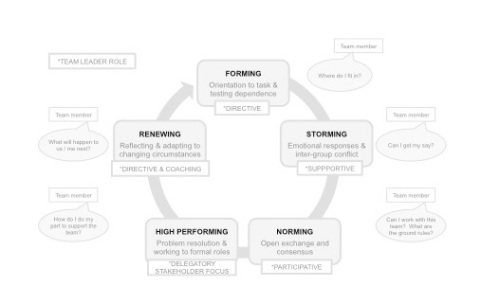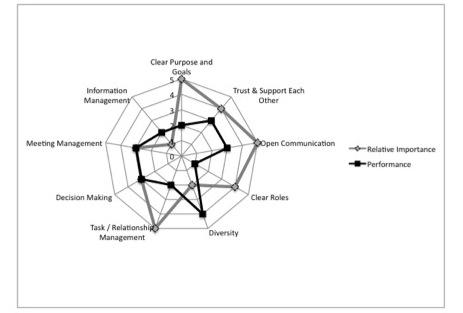By Elisabeth Goodman and Lucy Loh
This is the fourth in our series of blogs on “Enhancing Team Effectiveness in a time of change” based on our recent publication in Business Information Review(1), and other publications and seminars in progress.
In our first blog (Enhancing team effectiveness in a time of change – an introduction), we described the challenges being faced by organisations, teams and individuals and the impact that these changes have on them.
Our second blog (Recognising reactions to change, and responding to them) explored how people (either as individuals or teams) respond to change and how to help them through their journeys in a positive way.
Our third blog (Tools for supporting teams during their journeys through change) introduced five more specific tools for supporting teams during their journeys through change.
This fourth blog explores three of the tools: team development, pre-requisites for success and team temperature checks in more detail. Our next and final blog in this series will explore the other two tools: Lean and Six Sigma in Change Management and Dilts’ Logical Levels of Change. We will also prompt you to reflect on the series of blogs on this topic, and initiate some activity to review and enhance the effectiveness of the teams you belong to.
Using a team development model to progress towards and sustain a ‘high performance’ team
We have used a version of the Tuckman(2) and Hersey-Blanchard(3) team development models with teams that are just starting up, as well as with already established teams. It helps leaders and team members to understand where the team is in its evolution, and what they could do to help it develop towards a stage of ‘high performance’.
The renewing (also sometimes referred to as ‘mourning’) and forming stages are the ones that will happen most frequently at a time of change for the team. These are the ones that require the most ‘hands-on’ and directive attention from the leader. For a team going through change and renewal, it is important for the team leader and members to celebrate the successes of the past (as previously mentioned), and to take note of what made them successful.
Team leaders and members may fear and try to avoid the storming stage but this is an important time for people to air their views openly and share their ideas constructively in order to make the team stronger.
In fact the team leader needs to play a different role at different stages: one-on-one interactions with team members are especially valuable in the storming stage and a focus outwards to stakeholders in the high performing stage. Through awareness of these different stages, team members can also support the team leader and other team members, as well as ensure that they are fully developing their role within the team.
Structured learning techniques such as discussing other teams’ experiences in ‘Peer Assists’ at the start of a team’s life, conducting ‘After Action Reviews’ (timely debriefs on lessons learnt) at key milestones, and holding in-depth ‘Learning Retrospects’ at the end of a team’s life can be particularly useful to capture and share lessons learnt between existing and new team members and others outside of the team(4).
Identifying and agreeing on best practices as pre-requisites for success
We have coached team leaders in using variations of a list of prerequisites as a checklist for effectiveness. Team members can help to identify, prioritise and explore best practices for check-lists such as the following:
- Clear purpose & goals
- Trust & support each other
- Open communication
- Clear roles
- Diversity
- Task / Relationship Balance
- Decision Making
- Meeting management
- Information Management
Using team temperature checks to monitor and enhance team effectiveness
We use team temperature checks as a diagnostic with the previous prerequisites, at a time of change, to determine the status of the team, and to actively engage team members on the priorities to be addressed going forward.
The relative importance of each prerequisite will change during the life of the team, as will the team’s perception of how well they are performing. Rather than dwell retrospectively on everything that is not working, the team should focus on the biggest gaps between importance and performance of a prerequisite, and explore the suggestions for improvement in order to move forward in a constructive way.
At the request of team leaders, we have polled members individually to obtain ratings of the perceived importance and performance against each prerequisite, and to encourage them to make suggestions for improvement to bring back to a team workshop. Using an external objective facilitator can help with this, although in the long-term teams could manage this themselves e.g. by doing periodic ‘After Action Reviews’ in team meetings, or at key milestones.
In a time of change it may also be appropriate to involve customers, suppliers and other stakeholders in this process. This will deliver two benefits: getting some external input, and also building relationships with people of importance to the team either during or after the change.
Notes
- Goodman, E and Loh, L. (2011) Organisational change: a critical challenge for team effectiveness. Business Information Review, 28(4) 242-250
- Tuckman, B. and Jensen, M. (1977) Stages of small group development revisited, Group and Organizational Studies, 419-27
- Hersey, P and Blanchard, K Situational Leadership. See for example : www.12manage.com
- Collison, Chris and Parnell, Geoff (2004) Learning to Fly: Practical Knowledge Management from Leading and Learning Organizations. Capstone; 2nd Edition
Elisabeth Goodman is the Owner and Principal Consultant at RiverRhee Consulting, a consultancy that helps business teams to enhance their effectiveness for greater productivity and improved team morale. Elisabeth has 25+ years’ experience in the Pharmaceutical Industry where she has held line management and internal training and consultancy roles supporting Information Management and other business teams on a global basis. Elisabeth is accredited in Change Management, in MBTI (Myers Briggs Type Indicator) and in Lean Sigma and is a member of CILIP (Chartered Institute for Library and Information Professionals), and APM (Association for Project Management).
Lucy Loh is the Owner and Principal Consultant at Lucy Loh Consulting, a consultancy that helps businesses and organisations develop their business plans, and manage change in their organisations and teams to be able to deliver those plans. She is also a RiverRhee Consulting Associate. Lucy has 25 years’ experience in BioPharma, where she has held management roles in strategy development and all aspects of performance management, as well as extensive internal consulting. Lucy has expertise and experience in organisation development, benefits management and in designing and leading business change. She is a certified Master Practitioner of NeuroLinguistic Programming (NLP), which enhances her work in change management and individual coaching. She is also an accredited trainer with the Institute of Leadership and Management for Strategic Leadership.


